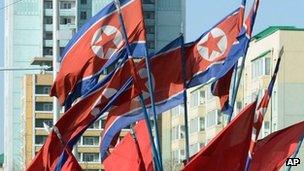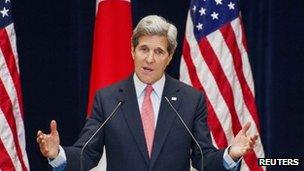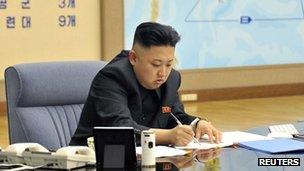Viewpoint: Are US-North Korea talks possible?
- Published

North Korea says it will not talk until all UN sanctions against it have been repealed
While North Korean rhetoric appears to be finally tapering off, tensions on the Korean Peninsula persist. In a matter of only a few weeks, the Kim regime has unravelled two of the greatest successes of detente with its adversaries.
Pyongyang announced that it would restart production of plutonium for nuclear weapons at its Yongbyon reactor, whose cooling tower was famously demolished in 2008 as part of its commitment to the six-party talks.
More recently, it has withdrawn from the joint Kaesong Industrial Zone with South Korea.
These developments serve as a reminder that talks with North Korea can yield modest, but desirable outcomes like the establishment of Kaesong.
Dialogue should not be expected to end North Korea's nuclear programme, especially in the near-term. But it may help defuse the current tensions and avoid a return to escalation.
Washington and Pyongyang are now trading conditions for resuming regular official engagement, which would be more than just "talks for talks' sake".
That is, if concerned nations could agree on the subject of, and forum for, discussion. It is here that the greatest divide lies.
On his recent trip to Asia, Secretary of State John Kerry reiterated that Washington is ready to engage with Pyongyang, but only if certain conditions are met.

The US wants denuclearisation to be a precursor to negotiations with North Korea
His offer presumably relates to more regular, official talks than those already quietly and sporadically taking place.
Foremost among his conditions is a demonstration by the North of "seriousness of purpose to go towards denuclearisation".
This could be done by, for instance, ceasing production of fissile material for nuclear weapons or refraining from conducting missile tests.
Though the messenger may be new, Mr Kerry's conditional offer is not.
In theory, the Obama administration has for some time been quietly open to resuming nuclear talks with North Korea if convinced that Pyongyang would come to the table in good faith.
In response to Mr Kerry's statements, North Korea brushed off the subject of denuclearisation and announced its own list of conditions: the United States must apologise for its recent provocations, repeal all UN and unilateral sanctions, withdraw nuclear-capable assets from the region, and abstain from conducting military exercises on the Korean Peninsula.
Both lists of conditions are non-starters, and speak to the underlying, vast gap in opinion on what should be talked about.
Cemented positions
A useful framework for understanding the divide are the stalled six-party talks, the series of negotiations that began in 2003 between China, the US, North and South Korea, Japan and Russia, and were abandoned in 2009.
While active, the six-party talks had three multilateral working groups: peaceful energy co-operation; the denuclearisation of the Korean Peninsula; and peace and security in Northeast Asia.
The subject of the first working group on peaceful energy co-operation is unappetising to the US and its allies, for obvious reasons.
The second, denuclearisation, is of little interest to Pyongyang, which now heavily emphasises nuclear weapons in its national doctrine. Washington needs Pyongyang to discuss denuclearisation much more than the reverse, and until that changes, the North is unlikely to be tempted into talks on this subject.
However, Pyongyang favours keeping the third avenue for dialogue open, though perhaps not with a six-party talks label. From their point of view, a peace treaty is needed to guarantee the absence of an external enemy before the country can safely renounce nuclear weapons.
Washington believes the opposite: fully normalised relations are not possible while the North maintains an active nuclear-weapons programme.
At the moment, none of these topics are palatable to all key countries, and the latest crisis has cemented the difference of opinion.

North Korea is unlikely to move towards denuclearisation anytime soon
In January, North Korea's National Defence Commission declared flatly that North Korea would maintain a nuclear deterrent so long as other states possess nuclear weapons - a policy conveniently borrowed from the US and UK.
This position was later bolstered by the Supreme People's Assembly, which declared nuclear weapons to be "the nation's life".
If there was any doubt about North Korea's disinterest in talking about disarmament, it has now been shattered.
The latest conflict may also have hardened Washington's stance against broader peace and security talks.
North Korea's March decision to restart plutonium production and its apparent quest to develop an inter-continental nuclear strike capability may have convinced the Obama administration that dialogue on non-nuclear issues would give the Kim regime precious time to further advance its nuclear and missile programmes.
As Pyongyang slowly creeps closer to a long-range nuclear missile, time is something the US cannot afford.
As a result, the US may feel that anything but denuclearisation talks, with a preceding North Korean demonstration of sincerity, would be unacceptable.
Bilateral or multilateral?
Statements by the US and North Korea also largely avoid the question of whether sustained, official talks should be bilateral or multilateral.
North Korea has long preferred to deal directly with its adversary. The Obama administration, on the other hand, seems wary of getting burned in another bilateral effort.
The failed 2012 "Leap Day Agreement", which traded North Korean nuclear concessions for American food aid, quickly fell apart to Washington's chagrin.
Indeed, for the time being, the US may have locked itself into a primarily multilateral approach to the North Korean problem.
Amid the recent tensions, the US repeatedly declared Beijing the "key" to resolving the stand-off, in hopes of pressuring them to abandon their traditional apathy. Any effort to resolve Korean Peninsula insecurity without the "key" would now therefore seem nonsensical.
It is clear from the latest tensions that the United States and North Korea continue to disagree about what to talk about, and whom to talk about it with.
And despite Mr Kerry's assertion that he will not "be so stuck in the mud that an opportunity to actually get something done is flagrantly wasted", it is unfortunately difficult to foresee anything in the near term that could create common ground.
Regular dialogue with the US and North Korea at the table is far out of reach.
Andrea Berger is a research fellow in nuclear analysis at the Royal United Services Institute. Follow her on Twitter @AndreaRBerger.